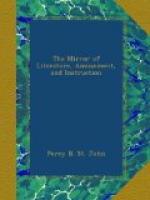Langsyne!—the days of childhood warm,
When, tottering by a mother’s knee,
Each sight and sound had power to charm,
And hope was high, and thought was free.
Langsyne!—the merry schoolboy days—
How sweetly then life’s sun did
shine!
Oh! for the glorious pranks and plays,
The raptures of Langsyne!
Langsyne!—yes, In the sound, I hear
The rustling of the summer grove,
And view those angel features near,
Which first awoke the heart to love.
How sweet it is, in pensive mood,
At windless midnight to recline,
And fill the mental solitude
With spectres from Langsyne!
Langsyne!—ah, where are they who shared
With us its pleasures bright and blithe?
Kindly with some hath fortune fared;
And some have bowed beneath the scythe
Of death; while others, scattered far,
O’er foreign lands at fate repine,
Oft wandering forth, ’neath twilight’s
star,
To muse on dear Langsyne!
Langsyne!—the heart can never be
Again so full of guileless truth—
Langsyne! the eyes no more shall see,
Ah, no! the rainbow hopes of youth.
Langsyne! with thee resides a spell
To raise the spirit, and refine
Farewell!—there can be no farewell
To thee, loved, lost Langsyne!
Of the prose articles, we have already given some specimens—The Hour Too Many, a fortnight since; and Vicenza, just quoted. The next we notice is Recollections of Pere la Chaise, for the graphic accuracy of which we can answer; Eliza Carthago, an African anecdote, by Mrs. Bowditch; Terence O’Flaherty, a humorous story, by the Modern Pythagorean of Blackwood; two interesting stories of Modern Greece; a highly-wrought Persian Tale, by the late Henry Neele; Miss Mitford’s charming Cricketing Sketch; the Maid of the Beryl, by Mrs. Hofland; a Chapter of Eastern Apologues, by the Ettrick Shepherd; the Goldsmith of Westcheap, a story of the olden time—rather too long; and a characteristic Naval Sketch.
As we have already drawn somewhat freely on the present volume, we may adduce that as the best proof of the high opinion we entertain of its merits. The editor has only two or three pieces; but the excellent taste and judgment displayed in the editorship of the “Forget-me-not” entitle it to a foremost place among the “Annuals for 1829.”
* * * * *
The Literary Souvenir,
Edited by Alaric A. Watts, Esq.
If the present were the first volume of the Literary Souvenir, the name of the editor would be a passport to popularity; but as this is the fifth year of its publication, any recommendation of ours would be supererogatory.
But the Souvenir for 1829, realizes that delightful union of painting, engraving, and literature, (at whose beneficial influence we have glanced in our accompanying number) even more fully than its predecessors. Ten out of the twelve embellishments are from celebrated pictures, and the whole are by first-rate engravers. Of their cost we spoke cursorily in a recent number; so that we shall only particularize a few of the most striking.




